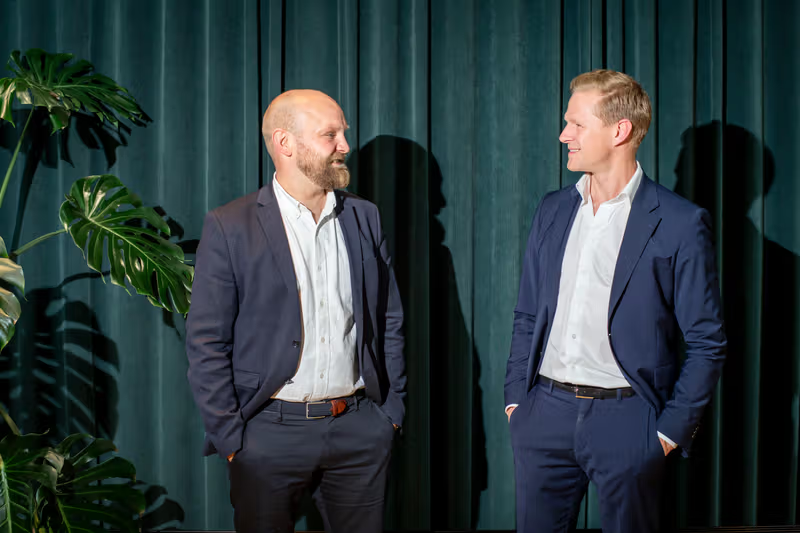
September 15, 2025
Thylander unveils plans for the first purely Danish 'hyperscale' data center
During 2026, Thylander expects to open the doors to Denmark’s first Danish-owned and -operated hyperscale data center, marking an important step toward achieving data sovereignty:
“We intend to change the fact that all major data centers in the country are foreign-owned,” says CEO Bjarke Mikkelsen.
This marks a milestone in Denmark’s digital history. For the first time, a fully Danish-developed, operated, and owned hyperscale data center — a facility exceeding 100 megawatts — will be launched.
The project is led by Thylander, which expects to cut the ribbon during 2026.
This is the first phase of a larger data center project that will eventually reach a capacity of up to 200 megawatts, making it one of the largest in Denmark.
“Data centers exist at the intersection between green energy and real estate. This is certainly something we can build and operate here in Denmark at the highest standards. We are already far ahead in the data center field, but all major centers are in foreign hands — and we intend to change that,” says Bjarke Mikkelsen, CEO of Thylander.
When fully developed, the data center represents a multi-billion DKK investment, years in the making. Meanwhile, the importance of a purely Danish data center has only grown.
Geopolitical tensions have fueled the debate about digital independence from American tech giants — a debate that intensified when a European prosecutor at the International Criminal Court had their email account blocked. Thus, this launch represents a significant step toward Danish data sovereignty.
A Unique Position
Denmark’s high concentration of large data centers is no coincidence. The combination of extensive fiber network rollout, geopolitical stability, access to green power, and a mild climate provides excellent conditions for data centers.
These qualities have attracted some of the world’s largest tech companies to establish facilities in Denmark.
But according to Bjarke Mikkelsen and Thylander, Denmark should capitalize on this unique position itself.
“We have all the prerequisites and the competence. Let’s set aside modesty. Of course we can develop and operate our own data centers and raise global standards for energy optimization and security. The Danish Centre of AI Innovation, with the Gefion computer, has already put Denmark on the map for responsible AI and quantum computing — and we’re following in their footsteps,” says Bjarke Mikkelsen.
To realize that ambition, Mikkelsen emphasizes the need for strong national partnerships, which he sees as a key learning from the project so far.
While Thylander contributes 40 years of experience in complex real estate projects in close cooperation with municipalities, additional expertise is required to build a hyperscale data center.
Thylander therefore expects to collaborate with Copenhagen Infrastructure Partners (CIP), a leading Danish energy investor. Advanced, innovative energy solutions can create major value for data centers, and CIP is one of the country’s most experienced players in this field.
At the same time, local partners will play a role — for example, in channeling excess heat from the data center into the district heating network.
Data in Safe Harbor
Nothing is left to chance when constructing a hyperscale data center. Location is one of the most critical factors. Several conditions are vital for operation, and the choice has fallen on Esbjerg.
One of the people behind that decision is Anders Frich Mathiesen, head of Thylander’s data center division and newly elected Chairman of the Danish Data Center Industry.
He emphasizes that Esbjerg is an ideal location. The city hosts Denmark’s only NATO-secured port, and the area offers excellent access to green energy from the North Sea and fiber connections across the Atlantic and continental Europe.
“Esbjerg meets all the criteria for an optimal site. It’s also crucial that we get a direct fiber connection to Europe through Germany — one that isn’t vulnerable to sabotage or ship anchors cutting underwater cables,” says Anders Frich Mathiesen.
The favorable conditions in West Jutland have drawn attention from others as well. Several smaller data centers are emerging or expected to follow in the area. Earlier this month, Esbjerg was even named Data Center Municipality of the Year.
Hosting Denmark’s first hyperscale data center has sparked local enthusiasm, as such a project brings jobs and investments.
“This is the result of a targeted regional effort to make Esbjerg a digital hub for Denmark. The project is a win for the entire region, and we’re proud to contribute to strengthening the nation’s digital backbone,” says Jesper Frost Rasmussen (V), Mayor of Esbjerg Municipality.
Recipe for Success
Close cooperation with the local community and municipality is a top priority for Thylander. Although data centers sometimes have a mixed reputation, they can make a positive contribution to local communities when developed the right way.
That applies both to new jobs during construction and operation — and to energy use. This latter challenge is a guiding principle for the Esbjerg data center’s development.
“Our goal is to play a positive role nationally but also locally. That’s why we’ve been ambitious about energy efficiency and material reuse,” says Anders Frich Mathiesen.
By working with local partners, the data center will feature a fully integrated cooling system that sends excess heat into the district heating network. It will also reuse seawater cooling infrastructure from the Esbjerg Power Plant.
Building a hyperscale data center is a complex and ambitious task — something both Anders Frich Mathiesen and Bjarke Mikkelsen readily acknowledge. However, the project is a key step in Thylander’s strategic focus on combining real estate development and technology.
As a result, the company has significantly expanded its team.
“We’ve needed to bring together the very best in the field — and we believe we’ve succeeded. We’re confident this is just the first step toward giving Danish companies the opportunity to harness responsible AI and massive computing power on home soil,” says Bjarke Mikkelsen, CEO of Thylander.